中文诗歌翻译
简单的中文诗歌翻译成英文
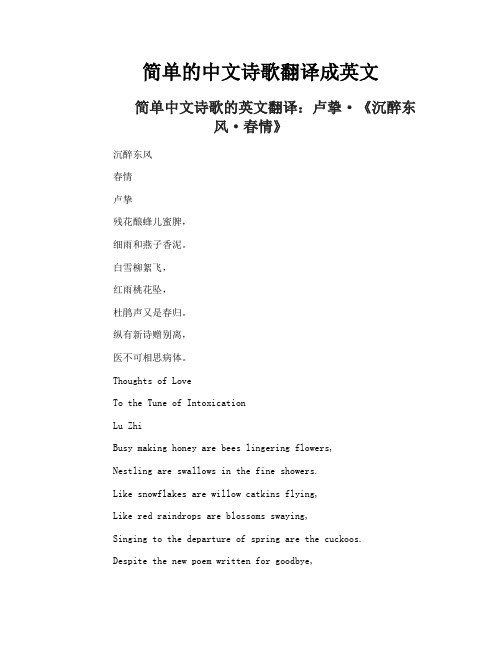
简单的中文诗歌翻译成英文简单中文诗歌的英文翻译:卢挚·《沉醉东风·春情》沉醉东风春情卢挚残花酿蜂儿蜜脾,细雨和燕子香泥。
白雪柳絮飞,红雨桃花坠,杜鹃声又是春归。
纵有新诗赠别离,医不可相思病体。
Thoughts of LoveTo the Tune of IntoxicationLu ZhiBusy making honey are bees lingering flowers,Nestling are swallows in the fine showers.Like snowflakes are willow catkins flying,Like red raindrops are blossoms swaying,Singing to the departure of spring are the cuckoos.Despite the new poem written for goodbye,There’s no remedy to love sickness worthy o f a try.中文诗歌的英语翻译:徐志摩·《春》春徐志摩河水在夕阳里缓流,暮霞胶抹树干树头;蚱蜢飞,蚱蜢戏吻草光光,我在春草里看看走走。
蚱蜢匐伏在铁花胸前,铁花羞得不住的摇头,草里忽伸出之藕嫩的手,将孟浪的'跳虫拦腰紧拶。
金花菜,银花菜,星星澜澜,点缀着天然温暖的青毡,青毡上青年的情偶,情意胶胶,情话啾啾。
我点头微笑,南向前走,观赏这青透春透的园囿,树尽交柯,草也骈偶,到处是缱绻,是绸谬。
雀儿在人前猥盼亵语,人在草处心欢面报,我羡他们的双双对对,有谁羡我孤独的徘徊?孤独的徘徊!我心须何尝不热奋震颤,答应这青春的呼唤,燃点着希望灿灿,春呀!你在我怀抱中也!?SpringXu ZhimoThe river is flowing slowly at sunset;Evening clouds cling to tree crown and tree trunk. Grasshoppers fly, grasshoppers playfully kiss the shining grass, I’m looking while walking in the spring meadow.Grasshoppers crouching on the chest of a flower;The flower is so timid that it cannot stop shaking its head.A soft pink hand stretches out from the grass,Hugging the impetuous grasshoppers tight.Golden plants, silver plants, scattering like starsEmbellish the welcoming grass.The young couples on the green carpetMurmuring lovers’ prattle, lingering sentiments.I nod and smile, walking towards the south,Appreciating this green spring garden;Trees chatting, grass communicating,There is love and passion everywhere.Sparrows joke frivolously in front of us,People blush with love in the grassland.I envy the couples,But who envies my lonely lingering?Lonely lingering,Not that my heart is not excited and quivering;Answering the call of youth,Lighting up the splendid hope,Oh, Spring! You are in my embrace.中文诗歌的英语形式:刘半农·《教我如何不想她》教我如何不想她刘半农天上飘着些微云,地上吹着些微风。
中国古代诗句英文翻译

中国古代诗句英文翻译诗歌是语言的精华,而意象是诗歌的灵魂和神韵所在。
中国古典诗歌因其丰富隽永的意象成为中国文学和世界文学的瑰宝。
下面是店铺带来的中国古代诗句英文翻译,欢迎阅读!中国古代诗句英文翻译篇一五言律诗戴叔伦江乡故人偶集客舍天秋月又满,城阙夜千重。
还作江南会,翻疑梦里逢。
风枝惊暗鹊,露草覆寒虫。
羁旅长堪醉,相留畏晓钟。
Five-character-regular-verseDai ShulunCHANGING ON OLD FRIENDS IN A VILLAGE INNWhile the autumn moon is pouring fullOn a thousand night-levels among towns and villages,There meet by chance, south of the river,Dreaming doubters of a dream....In the trees a wind has startled the birds,And insects cower from cold in the grass;But wayfarers at least have wineAnd nothing to fear -- till the morning bell.中国古代诗句英文翻译篇二五言律诗卢纶李端公故关衰草遍,离别正堪悲。
路出寒云外,人归暮雪时。
少孤为客早,多难识君迟。
掩泪空相向,风尘何处期。
Five-character-regular-verseLu LunA FAREWELL TO LI DUANBy my old gate, among yellow grasses,Still we linger, sick at heart.The way you must follow through cold cloudsWill lead you this evening into snow.Your father died; you left home young;Nobody knew of your misfortunes.We cry, we say nothing. What can I wish you,In this blowing wintry world?中国古代诗句英文翻译篇三五言律诗李益喜见外弟又言别十年离乱后,长大一相逢。
中文诗歌用英语怎么样翻译
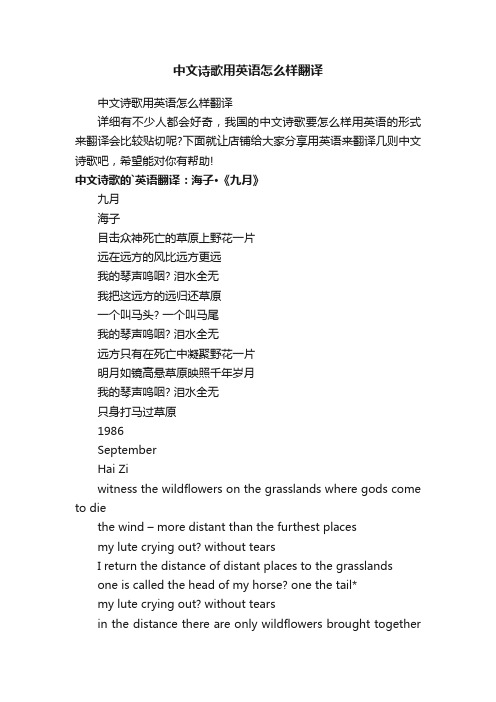
中文诗歌用英语怎么样翻译中文诗歌用英语怎么样翻译详细有不少人都会好奇,我国的中文诗歌要怎么样用英语的形式来翻译会比较贴切呢?下面就让店铺给大家分享用英语来翻译几则中文诗歌吧,希望能对你有帮助!中文诗歌的`英语翻译:海子·《九月》九月海子目击众神死亡的草原上野花一片远在远方的风比远方更远我的琴声呜咽? 泪水全无我把这远方的远归还草原一个叫马头? 一个叫马尾我的琴声呜咽? 泪水全无远方只有在死亡中凝聚野花一片明月如镜高悬草原映照千年岁月我的琴声呜咽? 泪水全无只身打马过草原1986SeptemberHai Ziwitness the wildflowers on the grasslands where gods come to diethe wind – more distant than the furthest placesmy lute crying out? without tearsI return the distance of distant places to the grasslandsone is called the head of my horse? one the tail*my lute crying out? without tearsin the distance there are only wildflowers brought togetherin deaththe bright moon like a mirror hung high over the grasslands, shines down on a thousand yearsmy lute crying out? without tearsalone whipping my horse crossing the grasslands1986中文诗歌的英文形式:辛弃疾·《青玉案·元夕》青玉案元夕辛弃疾东风夜放花千树,更吹落、星如雨。
优美中文诗歌英文翻译

【导语】学习⼀门语⾔,必须学习相关的⽂化背景知识。
中国古典诗歌是⼀座宝库,在艺术性,形象性,⾳乐性⽅⾯,有着独特的魅⼒,它是中国⽂学璀璨的明珠,具有丰富的⽂化内涵。
下⾯是由带来的优美中⽂诗歌英⽂翻译,欢迎阅读!【篇⼀】优美中⽂诗歌英⽂翻译 常建 题破⼭寺后禅院 清晨⼊古寺,初⽇照⾼林。
曲径通幽处,禅房花⽊深。
⼭光悦鸟性,潭影空⼈⼼。
万籁此俱寂,惟余钟磬⾳。
Five-character-regular-verse Chang Jian A BUDDHIST RETREAT BEHIND BROKEN-MOUNTAIN TEMPLE In the pure morning, near the old temple, Where early sunlight points the tree-tops, My path has wound, through a sheltered hollow Of boughs and flowers, to a Buddhist retreat. Here birds are alive with mountain-light, And the mind of man touches peace in a pool, And a thousand sounds are quieted By the breathing of a temple-bell.【篇⼆】优美中⽂诗歌英⽂翻译 岑参 寄左省杜拾遗 联步趋丹陛,分曹限紫微。
晓随天仗⼊,暮惹御⾹归。
⽩发悲花落,青云羡鸟飞。
圣朝⽆阙事,⾃觉谏书稀。
Five-character-regular-verse Cen Can A MESSAGE TO CENSOR Du Fu AT HIS OFFICE IN THE LEFT COURT Together we officials climbed vermilion steps, To be parted by the purple walls.... Our procession, which entered the palace at dawn, Leaves fragrant now at dusk with imperial incense. Grey heads may grieve for a fallen flower, Or blue clouds envy a lilting bird; But this reign is of heaven, nothing goes wrong, There have been almost no petitions.【篇三】优美中⽂诗歌英⽂翻译 杜甫 ⽉夜 今夜鄜州⽉,闺中只独看。
i'm nobody 诗歌汉译
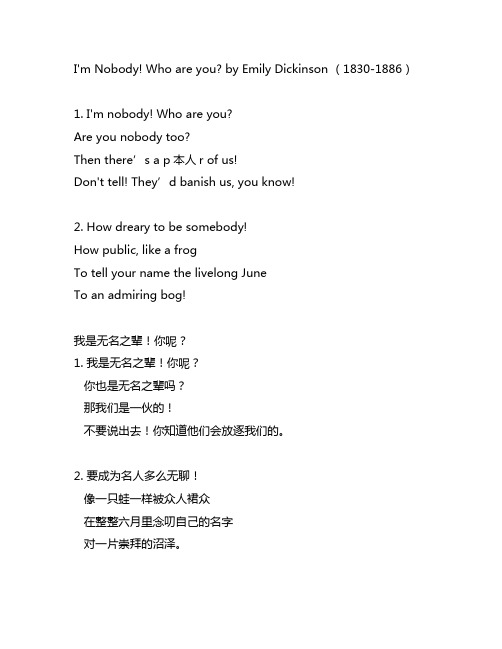
I'm Nobody! Who are you? by Emily Dickinson (1830-1886)1. I'm nobody! Who are you?Are you nobody too?Then there’s a p本人r of us!Don't tell! They’d banish us, you know!2. How dreary to be somebody!How public, like a frogTo tell your name the livelong JuneTo an admiring bog!我是无名之辈!你呢?1. 我是无名之辈!你呢?你也是无名之辈吗?那我们是一伙的!不要说出去!你知道他们会放逐我们的。
2. 要成为名人多么无聊!像一只蛙一样被众人裙众在整整六月里念叨自己的名字对一片崇拜的沼泽。
以上是美国诗人艾米莉·狄金森所作诗歌《我是无名之辈》的原文,以下为该诗的汉译:我是无名之辈!你呢?——艾米莉·狄金森1. 我是无名之辈!你呢?你也是无名之辈吗?那我们是一伙的!不要告诉他们!他们会把我们放逐。
2. 成为名人多么无聊!像蛙一样公开地在整整六月里对着仰慕的泥塘说出自己的名字。
这首诗简短而富有内涵,表达了诗人对于平凡的认同和对名利的厌倦之情。
通过对诗歌的汉译,我们也可以更加深入地理解诗意所在。
在第一节中,诗人通过对“无名之辈”的自我认同,暗示了对于平凡生活的接纳和渴望找到知己的心情。
她也警示了“不要告诉他们”,即不要向社会展现自己的真实面目,以免被排挤和孤立。
而第二节则明确表达了诗人对于成为名人和备受瞩目的反感之情,她将之形象地比喻为“公开地在整整六月里告诉泥塘自己的名字”,充满了对于世俗名利的鄙视和对于宁静平淡生活的向往。
在这首诗中,艾米莉·狄金森用简练而雄辩的语言,表达了自己对于平凡的理解和对于名利的厌倦之情,以及对于自由和隐秘生活的向往。
中国古诗名英文翻译对照
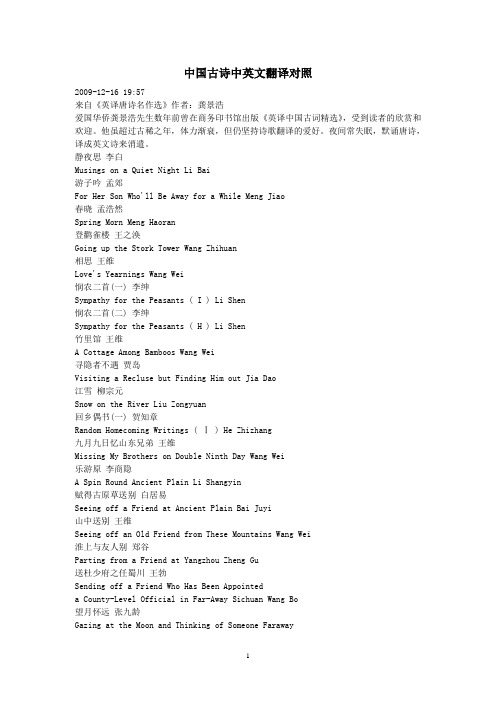
中国古诗中英文翻译对照2009-12-16 19:57来自《英译唐诗名作选》作者:龚景浩爱国华侨龚景浩先生数年前曾在商务印书馆出版《英译中国古词精选》,受到读者的欣赏和欢迎。
他虽超过古稀之年,体力渐衰,但仍坚持诗歌翻译的爱好。
夜间常失眠,默诵唐诗,译成英文诗来消遣。
静夜思李白Musings on a Quiet Night Li Bai游子吟孟郊For Her Son Who'll Be Away for a While Meng Jiao春晓孟浩然Spring Morn Meng Haoran登鹳雀楼王之涣Going up the Stork Tower Wang Zhihuan相思王维Love's Yearnings Wang Wei悯农二首(一) 李绅Sympathy for the Peasants ( I ) Li Shen悯农二首(二) 李绅Sympathy for the Peasants ( H ) Li Shen竹里馆王维A Cottage Among Bamboos Wang Wei寻隐者不遇贾岛Visiting a Recluse but Finding Him out Jia Dao江雪柳宗元Snow on the River Liu Zongyuan回乡偶书(一) 贺知章Random Homecoming Writings ( Ⅰ ) He Zhizhang九月九日忆山东兄弟王维Missing My Brothers on Double Ninth Day Wang Wei乐游原李商隐A Spin Round Ancient Plain Li Shangyin赋得古原草送别白居易Seeing off a Friend at Ancient Plain Bai Juyi山中送别王维Seeing off an Old Friend from These Mountains Wang Wei淮上与友人别郑谷Parting from a Friend at Yangzhou Zheng Gu送杜少府之任蜀川王勃Sending off a Friend Who Has Been Appointeda County-Level Official in Far-Away Sichuan Wang Bo望月怀远张九龄Gazing at the Moon and Thinking of Someone FarawayZhang J iuling白石滩王维White Stone Beach Wang Wei鸟鸣涧王维Birds Chirping over the Hill Creek Wang Wei春夜喜雨杜甫Propitious Rain Falling at Midnight Du Fu宿建德江孟浩然Staying Overnight on Jiande River Meng Haoran滁州西涧韦应物Chuzhou's West Brook Wei Yingwu题破山寺后禅院常建Meditation Rooms at the Back of the Cleft-BoulderHill Temple Chang Jian绝句杜甫A Heptasyllabic Quatrain Du Fu阙题刘脊虚A Poem Lacking a Title Liu Shenxu送元二使安西王维Sending off a Friend, Who Has Been Appointed Envoy to the West Lands Wang Wei凉州词王之涣Liangzhou Song Wang Zhihuan凉州词王翰Liangzhou Song Wang Hah夜宿山寺李白Staying Overnight in a Mountain Temple Li Bai杂诗(其二) 王维Miscellaneous Poems (Second in a Series) Wang Wei问刘十九自居易Asking a Friend Bai Juyi风李峤Wind Li Qiao马诗李贺A Horse Poem Li He秋浦歌李白Autumn Waterside Songs Li Bai剑客贾岛Jianke Jia Dao于易水送人骆宾王Sending off a Warrior By the Yishui River LuG Binwang 春怨金昌绪Complaint Against Spring lin Changxu竹枝词刘禹锡The Bamboo Song Liu Yuxi城东早春杨巨源Early Spring in East City Yang Juyuan晚春韩愈Late Spring Han Yu山亭夏日高骈A Summer's Day in a Hill Garden Gao Pian秋日耿讳An Autumn Day Geng Wei白雪歌送武判官归京岑参Snow (For Chief of Secretarial Staff Wu,Who Was B&ng Called Back to the Capital) Cen Shen过故人庄孟浩然Visiting an Old Friend's Country Place Meng Haoran江村即事司空曙Scene from a Riverside Village Sikong Shu社日王驾Community Day Wang Jia送人游吴杜荀鹤Seeing off a Friend, Who Was Going to Tour Suzhou Du Xunhe 枫桥夜泊张继Night Boat Call at Maple Bridge, Suzhou Zhang Ji早发白帝城李白Sailing Early from Baidi Town Li Bai黄鹤楼送孟浩然之广陵李白Seeing off Fellow Poet Meng Haoran, Who WasLeaving the Yellow Crane Tower for Yangzhou Li Bai黄鹤楼崔颢The Yellow Crane Tower Cui Hao夜雨寄北李商隐A Letter Sent North about These Nightly Rainsin Bashan Mountains Li Shangyin无题李商隐Poem Without a Title Li Shangyin登幽州台歌陈子昂Ascending Youzhou Terrace Chen Zi'ang与诸子登岘首孟浩然Climbing Mount Xianshou with Scholarly Friends Meng Haoran 滕王阁王勃Prince of Teng's Pavilion-House Wang Bo洛阳道储光羲The Luoyang Highway Chu Guangxi遣悲怀元稹Venting My Sorrow Yuan Zhen赠卖松人于武陵To a Tree Vendor Yu Wuling乌衣巷刘禹锡Black Robe Lane Liu Yuxi清明杜牧The Day of Clear and Bright Du Mu江南春杜牧Spring Comes to Jiangnan Du Mu泊秦淮杜牧Overnight Stay on Qinhuai River, Nanjing Du Mu山行杜牧Driving by the Mountain Du Mu金缕衣杜秋娘Garment Stitched with Gold Threads Du Qiuniang自遣罗隐Self Consolation Luo Yin题都城南庄崔护South Side of the Capital City Cui Hu月下独酌李白Drinking Alone Underneath a Moon Li Bai将进酒李白Drink Your Fill! Li Bai春日忆李白杜甫Remembering Li Bai on a Spring Day Du Fu春望杜甫Spring Outlook Du Fu前出塞杜甫Song of the Fortified Town (One from a First Group of"Fortified Town" Poems) Du Fu石壕吏杜甫A Village Official Du Fu陪诸贵公子丈八沟携妓纳凉晚际遇雨杜甫A Cruise on Long-Ditch Creek in the Company of Some Young Gentlemen and Their "Hired" Ladies, and Got Caught in a Shower Along the Twilight Hour Du Fu与朱山人杜甫To Zhu—the Mountain Person Du Fu赠卫八处士杜甫To a Younger Friend, Who Is a Retiring Sort of Person Du Fu李白篇送友人青山横北郭白水绕东城此地一为别孤蓬万里征浮云游子意落日故人情挥手自兹去萧萧班马鸣Farewell To A FriendGreen mountains bar the northern sky;White water girds the eastern town.Here is the place to say good-bye;You'll drift like lonely thisledown.With floating cloud you'll float away;Like parting day I'll part from you.We wave as you start on your way;Our steeds still neigh, "Adieu, adieu!"登金陵凤凰台凤凰台上凤凰游凤去台空江自流吴宫花草埋幽径晋代衣冠成古丘三山半落青天外二水中分白鹭洲总为浮云能蔽日长安不见使人愁On Phoenix Terrace At JinlingOn Phoenix Terrace once phoenixes came to sing;The birds are gone, but still roll on the river's waves. The ruined palace's buried 'neath the weeds in spring; The ancient sages in caps and gowns all lie in graves. The three-peak'd mountain is half lost in azure sky; The two-fork'd stream by Egret Isle is kept apart.As floating clouds can veil the bright sun from the eye, Imperial Court, now out of sight, saddens my heart.宣州谢眺楼饯别校书叔云弃我去者昨日之日不可留乱我心者今日之日多烦忧长风万里送秋雁对此可以酣高楼蓬莱文章建安骨中间小谢又清发俱怀逸兴壮思飞欲上青天览明月抽刀断水水更流举杯销愁愁更愁人生在世不称意明朝散发弄扁舟Farewell To Uncle Yun, The Imperial Librarian, At The Xie Tiao Pavilion In XuanzhouWhat left me yesterdayCan be retained no more;What worries me todayAre the times for which I feel sore.In autumn wind for miles and miles the wild geese fly.Let's follow them with eyes and drink in tower high.Your writing's forcible, like ancient poets, whileMine is in Junior Xie's direct and easy style.Both of us have ambitions high;We'd bring the moon down from the sky.Cut running water with a sword, it will faster flow;Drink wine to drown your sorrow, it will heavier grow.If we despair in our lifetime of all affairs,Tomorrow let us sail away with loosened hairs.赠汪伦李白乘舟将欲行忽闻岸上踏歌声桃花潭水深千尺不及汪伦送我情To Wang LunI, Li Bai, sit aboard a ship about to goWhen suddenly on shore your farewell songs o'erflow. However deep the Lake of Peach Blossom may be,It's not so deep, O Wang Lun! as your love for me.早发白帝城朝辞白帝彩云间千里江陵一日还两岸猿声啼不住轻舟已过万重山Leaving White Emperor Town At DawnLeaving at dawn the White Emperor crowned with cloud, I've sailed a thousand li through canyons in a day. With monkeys' sad adieus the riverbanks are loud;My skiff has left ten thousand mountains far away.月下独酌花间一壶酒独酌无相亲举杯邀明月对影成三人月既不解饮影徒随我身暂伴月将影行乐须及春我歌月徘徊我舞影零乱醒时同交欢醉后各分散永结无情游相期邈云汉Drinking Alone Under The MoonAmong the flowers from a pot of wineI drink alone beneath the bright moonshine.I raise my cup to invite the moon, who blendsHer light with my shadow and we're three friends. The moon does not know how to drink her share;In vain my shadow follows me here and there. Together with them for the time I stayAnd make merry before spring's spend away.I sing the moon to linger with my song;My shadow disperses as I dance along.Sober, we three remain cheerful and gay; Drunken, we part and each goes his way.Our friendship will outshine all earthly love; Next time we'll meet beyond the stars above.杜甫篇望岳岱宗夫如何齐鲁青未了造化钟神秀阴阳割昏晓荡胸生层云决眦入归鸟会当凌绝顶一览众山小Gazing At Mount TaiO, peak of peaks, how high it stands!One boundless green o'erspreads two states.A marvel done by nature's hands,O'er light ang shade it dominates.Clouds rise therefrom and lave my breast;I strain my eyes and see birds fleet.I must ascend the mountain's crest;It dwarfs all peaks under my feet.赠李白秋来相顾尚飘蓬未就丹砂愧葛洪痛饮狂歌空度日飞扬跋扈为谁雄To Li BaiWhen autumn comes, you're drifting still like thistledown. You try to find the way to heaven, but you fail.In singing mad and drinking dead your days you drown.For whom will fly the roc? For whom will leap the whale?兵车行车辚辚马萧萧行人弓箭各在腰耶娘妻子走相送尘埃不见咸阳桥牵衣顿足拦道哭哭声直上干云霄道旁过者问行人行人但云点行频或从十五北防河便至四十西营田去时里正与裹头归来头白还戍边边廷流血成海水武皇开边意未已君不闻汉家山东二百州千村万落生荆杞纵有健妇把锄犁禾生陇亩无东西况复秦兵耐苦战被驱不异犬与鸡长者虽有问役夫敢伸恨且如今年冬未休关西卒县官急索租租税从何出信知生男恶反是生女好生女犹得嫁比邻生男埋没随百草君不见青海头古来白骨无人收新鬼烦冤旧鬼哭天阴雨湿声啾啾Song Of The ConscriptsChariots rumbleand horses grumble.The conscripts march with bow and arrows at the waist.Their fathers, mothers, wives and children come in hasteTo see them off; the bridge is shrouded in dust they've raised.They clutch at the men's coats and stamp and bar the way;Their grief cries loud and strikes the cloud straight, straightaway. Another onlooker by roadside asks an enrollee,"The conscription is frequent," only answers he."Some went north at fifteen to guard the rivershoreAnd were sent west to till the land at forty-four.The elder bound their young heads when they went away;Just home, they're sent to the frontier though their hair's grey. The field on borderland becomes a sea of blood;The emperor's greed for land is still at high blood.Have you not heard two hundred districts east of the Hua Mountain lie Where briers and brambles grow in villages far and night?Although stout women can wield the plough and the hoe,They know not east from west where thorns and weeds o'ergrow.The enemy are used to hard and stubborn fight:Our men are driven just like dogs or fowls in flight.You are kind to ask me.To complain I'm not free.In winter of this yearConscription goes on here.The magistrates for taxes press;How can we pay them in distress!If we had known sons bring no joy,We'd have preferred girl to boy.A daughter can be married to a neighbour, alas!A son can only be buried under the grass!Have you not seenOn borders greenBleached bones since olden days unburied on the plain?The old ghosts weep and cry, while the new ghosts complain;The air is loud with screech and scream in gloomy rain."将进酒 ----李白君不见,黄河之水天上来,奔流到海不复回?君不见,高堂明镜悲白发,朝如青丝暮成雪?人生得意须尽欢,莫使金樽空对月,天生我材必有用,千金散尽还复来。
古代诗歌四首翻译初一

古代诗歌四首翻译初一(一)观书有感二首·其一宋代:朱熹半亩方塘一鉴开,天光云影共徘徊。
问渠那得清如许?为有源头活水来。
(那通:哪)译文半亩大的方形池塘像一面镜子一样打开,清澈明净,天光、云影在水面上闪耀浮动。
要问池塘里的水为何这样清澈呢?是因为有永不枯竭的源头源源不断地为它输送活水。
注释方塘:又称半亩塘,在福建尤溪城南郑义斋馆舍(后为南溪书院)内。
朱熹父亲朱松与郑交好,故尝有《蝶恋花·醉宿郑氏别墅》词云:“清晓方塘开一境。
落絮如飞,肯向春风定。
”鉴:一说为古代用来盛水或冰的青铜大盆。
镜子;也有学者认为镜子。
指像鉴(镜子)一样可以照人。
“天光”句:是说天的光和云的影子反映在塘水之中,不停地变动,犹如人在徘徊。
徘徊:来回移动。
为:因为。
渠:它,第三人称代词,这里指方塘之水。
那得:怎么会。
那:怎么的意思。
清如许:这样清澈。
如:如此,这样。
清:清澈。
源头活水:比喻知识是不断更新和发展的,从而不断积累,只有在人生的学习中不断地学习、运用和探索,才能使自己永保先进和活力,就像水源头一样。
古代诗歌四首翻译初一(二)春夜洛城闻笛 / 春夜洛阳城闻笛唐代:李白谁家玉笛暗飞声,散入春风满洛城。
此夜曲中闻折柳,何人不起故园情。
译文是谁家精美的笛子暗暗地发出悠扬的笛声。
随着春风飘扬,传遍洛阳全城。
就在今夜的曲中,听到故乡的《折杨柳》,哪个人的思乡之情不会因此而油然而生呢?注释①洛城:今河南洛阳。
②玉笛:笛子的美称。
③暗飞声:声音不知从何处传来。
声:声音。
④春风:指春天的风,比喻恩泽,融和的气氛等引申涵义⑤闻:听;听见。
⑥折柳:即《折杨柳》笛曲,乐府“鼓角横吹曲”调名,内容多写离情别绪。
胡仔《苕溪渔隐丛话后集》卷四:“《乐府杂录》云:‘笛者,羌乐也。
古典有《折杨柳》、《落梅花》。
故谪仙《春夜洛城闻笛》……’杜少陵《吹笛》诗:‘故园杨柳今摇落,何得愁中曲尽生?’王之涣云:‘羌笛何须怨杨柳,春风不度玉门关。
现代诗歌翻译中英对照版
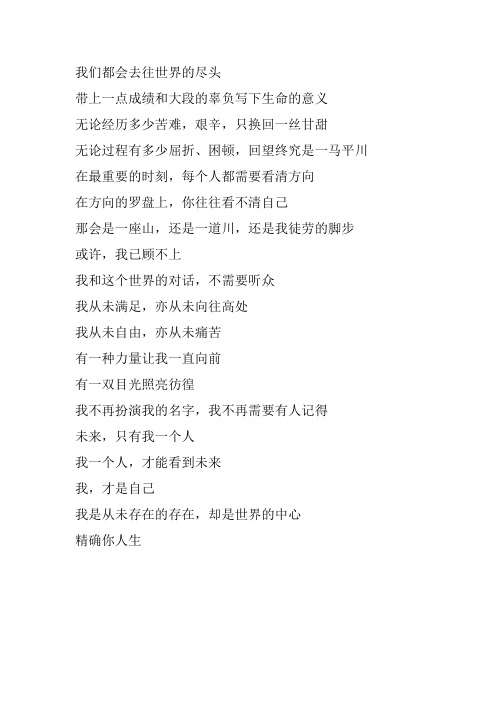
我们都会去往世界的尽头带上一点成绩和大段的辜负写下生命的意义无论经历多少苦难,艰辛,只换回一丝甘甜无论过程有多少屈折、困顿,回望终究是一马平川在最重要的时刻,每个人都需要看清方向在方向的罗盘上,你往往看不清自己那会是一座山,还是一道川,还是我徒劳的脚步或许,我已顾不上我和这个世界的对话,不需要听众我从未满足,亦从未向往高处我从未自由,亦从未痛苦有一种力量让我一直向前有一双目光照亮彷徨我不再扮演我的名字,我不再需要有人记得未来,只有我一个人我一个人,才能看到未来我,才是自己我是从未存在的存在,却是世界的中心精确你人生We all go to the end of the world.Bring a little achievement and a large regrets to write down the meaning of life.No matter how much hardships we have suffered, and only a little sweet fruits we get.No matter how many difficulties the process has, it is ultimately a matter of remembrance.At the most important moment, everyone needs to drive his or her direction.In the direction of the life , people often do not see themselves clearly.Will it be a mountain or a river, even my step in vain.Maybe I do not have enough time to care.My dialogue with this world needn’t an audience.I have never met and never hoped for heights.I have never been free and never pained.But there is a strength that keeps me moving.There is a pair of eyes shining.I was not just a name, I don’t need someone to remember any more.For the future, only meI was the only one who can hold the future.I, myselfI have never existed, but I am the center of the world Targeted your life。
- 1、下载文档前请自行甄别文档内容的完整性,平台不提供额外的编辑、内容补充、找答案等附加服务。
- 2、"仅部分预览"的文档,不可在线预览部分如存在完整性等问题,可反馈申请退款(可完整预览的文档不适用该条件!)。
- 3、如文档侵犯您的权益,请联系客服反馈,我们会尽快为您处理(人工客服工作时间:9:00-18:30)。
悦耳悦目,现场见效——漫谈涉外活动诗词佳句汉英翻译的现场效果吴伟雄(云浮市外事侨务局,广东省云浮市行政中心,527300)[内容提要]本文根据“翻译的目的不同,读者的对象不同,翻译所遵循的标准和运用的方法应有所不同”的原则以及著名诗人和诗词翻译家的诗论和译诗理论,结合作者的翻译实践,认为:涉外活动中诗词佳句的汉英翻译,在忠实于原文的基础上,必须使译品产生感染力强的“现场效果”;为此,则要使译品产生使人喜闻的“悦耳效果”、使人乐见的“悦目效果”、使人意会的“意似效果”或使人神会的“神似效果”。
在涉外工作的现场交流中,诗词佳句的汉英翻译,不但必须要做,而且可以逐步提高质量,译出比较满意的诗文来。
[关键词] 译诗理论; 翻译实践;涉外活动;现场效果;悦耳;悦目;意似;神似写诗不易,译诗更难。
在涉外工作的现场交流活动中,诗词佳句的英译,却不能回避。
郭建中教授在陈刚《西湖诗赞》的《序》中说:“译诗之难,尽人皆知;其中译古诗尤难。
但是,翻译的目的不同,读者的对象不同,翻译所遵循的标准和运用的方法应有所不同。
陈刚同志的译文,主要是供导游给游客介绍景点时用的,其译诗读起来必须琅琅上口,一听就懂,但又不失诗词之美”。
毛泽东说,诗要“精练、大体整齐,押韵。
”鲁迅提倡:“新诗先要有节调、押大致相近的韵,给大家容易记,又顺口,唱得出来。
”著名的诗词翻译家许渊冲认为,毛泽东和鲁迅对写诗的要求,“不但是写诗,译诗也该如此。
”领会伟人名家的诗论和译诗论,结合本人的翻译实践(以下译例,除注明外,均为笔者试译),我体会到:涉外活动中诗词佳句的英译,必须使译品产生感染力的强的“现场效果”。
为此,则要使译品产生使人喜闻的“悦耳效果”,使人乐见的“悦目效果”,使人意会的“意似效果”或使人神会的“神似效果” 。
1 感染力强的现场效果这是诗词佳句翻译的总体要求。
我们译诗,是让别人看,让别人听的,如果没有现场效果,就达不到现场交流的目的。
陈刚教授的古诗英译,就从英语导游的实用角度出发,“在翻译西湖古诗时,不拘泥于所选的诗词所涉及的具体背景,而在忠实于原文的基础上,注重…当场见效‟的口译效果,即力求译文口语化,有韵脚,有节奏感,读来上口,听来易懂,象是诗词”。
苏东坡赞美杭州西湖,诗曰:“水光潋滟晴方好,山色空朦雨亦奇;欲把西湖比西子,淡妆浓抹总相宜。
”陈刚接待来自美国夏威夷的旅行团时,朗诵了他预先译好的这首名诗:The shimmering ripples delight the eye on sunny days;The dimming hills present a rare view in rainy haze.West Lake may be compared to Beauty Xi Zi at her best,It becomes her to be richly adorned or plainly dressed.译诗刚诵完,就引来掌声和赞语:“太好了!”“真美!”“这是我们此次中国之行听到的唯一的一首中国诗。
”客人获得美的享受,导游本人也获得前所未有的快乐。
笔者也有多次“现场效果”的体验。
1990年,我陪同美中友协的伯顿先生到广东肇庆的鼎湖山参观。
导游着意介绍了一种特别的“茶”,叫“紫背天葵”,还发挥名人效应,把郭沫若的两句诗朗诵出来:客来不用茶和酒,紫背天葵酌满杯。
我事先看过资料,有所准备,就当场译出:You need no tea or wine to greet your guest,Purple Back Begonia will be the best.伯顿先生一听,马上说:“Wonderful! Mr. Wu, don‟t forget the special tea. I will do the business.”诗,本身就有感染力。
译出来的诗,只要易懂,大体整齐,大致押韵,也是有感染力的。
不少翻译名家有现成的汉诗译品,涉外翻译工作者学习引用的时候,也要看场合、对象和目的,而有所变通。
例如,唐代诗人王之涣有《登鹳鹊楼》诗:“白日依山尽,黄河入海流。
欲穷千里目,更上一层楼。
”我读过许渊冲教授aabb联韵式的译品(The sun beyond the mountain glows/The Yellow River seawards flows/You can enjoy a grander sight/By climbing a greater height)。
我也读过丰华瞻方家abab交韵式的译品(The sun is setting with abright hue/And a flowing river is in sight/To command a thousand mile view/Let‟s go up one more flight.。
两译均使我受益不浅。
然而,很多时候,人们常常喜欢引用王诗的后两句“欲穷千里目,更上一层楼”。
那么,许译的后两句,照用就产生“现场效果”;而隔行押韵的丰译,同一联中有音韵之隔,然而,其后两句只需换一个词,就得押韵之妙,体现“现场效果”:To command a thousand mile sight,Let‟s go up one more flight.侨居美国多年的王大濂教授的《英译唐诗绝句百首》,以“合理的节奏及规律的韵脚赋予诗文以音乐美和高雅的艺术享受”。
他的规律的韵脚,基本上是外人士都喜闻乐见的联韵,引用时,拿来即可。
例如,不少书法家爱写的孟浩然的两句诗,“野旷天低树,江清月近人”,他就译得通俗易懂,清新流畅,立见效果:The sky drops down below treetops in wild expanse;On lucid stream the shadow of moon kisses man‟s.今年初,我市接待一个来自南非的石材企业代表团。
适逢南非企业的老总生日。
在为他举办的晚会上,其合作伙伴送他一幅“满园春色关不住,一枝红杏出墙来”的中国画。
当时在宾馆里,我手头上没有现成资料,思考片刻,我译成押韵的两句:The spring could not be shut inside a garden, by closing the door,A branch of apricot blossom is coming out, needing spaces more.因为押韵,读来顺口,译文不但现场见效,还符合交流现场的实际。
此时,“红杏出墙”有了新意:双方要拓展市场,扩大合作领域,“needing spaces more”,正得其所哉。
2 使人喜闻的悦耳效果上面提到,译诗要做到“琅琅上口”、“有韵脚”、“押大致相近的韵”。
这是诗词的“音美以感耳。
”也就是说,诗词佳句的翻译,要有“悦耳效果”。
什幺是悦耳效果?理论也许难以说得清,实践结果却可以证明。
“有朋自远方来,不亦乐乎?”这是孔子《论语》的开卷之语。
此句的译文很多。
如:That friends should come to one from afar, is this not after all delightful? (Arthur Waley译)Isn‟t it a pleasure for oneto have like-minded people coming from faraway places?(王福林译)Is it not a delight after all to have friends come from afar ? (《汉英外事工作常用词汇》)Is it not pleasant to have friends coming from distant quarters? ( James Legge译)以上四译,都把孔圣人的这句名言译出来了,虽然对原文的结构和字构亦步亦趋,但是,较难称得上“琅琅上口”,也谈不上大致押韵。
笔者首创的一种译法,在现场交流中发挥了“悦耳效果”。
在1990年亚澳地区滑水锦标赛暨第五届亚洲滑水锦标赛的一个招待会上,主礼官宣布招待会开始的时候,人们还意犹未尽地继续原来各自的话题。
这时,开幕献词的官员说出“有朋自远方来,不亦乐乎”以后,我借助一流的音响设备,把推敲过的译文说出来:How happy we are,To meet friends from afar!会场骤然安静,接着,掌声响了起来。
这就是悦耳的音响效果。
一对欧洲来的夫妇对我说:“Mr. Wu, you are a poet!”在英译汉诗的时候,我坚持尽量做到大致押韵,尽量做到象诗。
下面是我对几种基本“韵”认识和在英译汉诗中的体会。
一是尽量用脚韵。
脚韵也叫尾韵,行尾韵,在诗行的末尾押韵,有“完全韵”和“不完全韵”或“元音迭韵”。
“完全韵”比较严格,一是重读的元音必须相同;二是元音后面的音素必须相同;三是元音前面的辅音必须是不同的音素。
“不完全韵”或“元音迭韵”是指两个或两个以上词的重读元音相同,元音前面的辅音也属不同的音素,但元音后面的辅音却不相同。
广东肇庆七星岩,传说乃天上七星降落而成。
1961年,郭沫若曾在天柱岩上勾留一宿,作有一诗:七星落地上,天柱立中流。
山多红豆树,窗对白凫洲。
月下开菱镜,云间结彩楼。
勾留过一宿,灯火是端州。
诗,刻在岩山下显眼的石面上。
常有外宾问起诗意。
作为当地的涉外翻译工作者,我把该诗以aa bb cc dd 的韵式译出来,收到较好的效果:Among the Seven Stars descended from the sky,The Heavenly Pillar stands in water, steep and high.All over the hills Love Bean trees grow;The Wild Duck Islet faces my window.The lake beneath the Moon spreads a mirror;The colored houses amid the clouds tower.I am attracted to stay here for one night,When Duanzhou is ablaze with city light.中国有句俗语:“大事化小,小事化了。
”很押韵。
有此一译:Reduce major issues to minor ones and minor ones to nothing.原话之意译出来了。
然而,没有押韵,不够悦耳。
当然,我们不是说,凡诗都要韵译。
可是,苟锡泉教授说得好,“诗歌,是一种有节奏和韵律的文学体裁”。
